International Business Law-Law of Product Liability
国际商法 第二版 英文版 姜作利 课件

2020/3/8
III Sources of international business law
D International trade customs and usages
• Influence: not law, but plays an important role. • 1. as binding rules by agreed upon by the parties to the
2020/3/8
III Sources of international business law
A National law
The most important source. Take China as an example: The Contract Law Trademark Law Chinese-Foreign joint Venture (Cooperative) Law, The Civil Procedure Law Arbitration Law
Examples: 1. Model Law on International Commercial Arbitration by
the United Nations Commission on International Trade Law (联合国国际贸易法委员会国际商事仲裁示范法 UNCITRAL Model Law) 2. Principles of International Commercial Contract by the International Institute for the Unification of Private Law (国际统一私法协会国际商事合同通则, UNIDROIT PICC )
国际商法

•Informal: No special form is required.
(3)valid,void, ) voidable contracts
有效合同、 有效合同、无效 合同、 合同、可撤销合同
•Valid: with legal effect •Void: without legal effect
Legal Sources
• United Nations Convention on Contracts for the International Sale of Goods/1988,1,1 , , 【CISG】 】
联合国国际货物 销售(买卖 买卖)合同公约 销售 买卖 合同公约
• Principles of International Commercial Contracts 1994/2004 【PICC】 】
Section 2 Offer
a. relevant concepts
(1) offer )
a definite proposal by one party to enter into a contract with other party.
•Offeror 要约方/要约人 要约方 要约人 •Offeree 受要约方/受要约人 受要约方 受要约人
国际商事合同通则 (2004/1994) )
• The objective of the UNIDROIT Principles is to establish a balanced set of rules designed for use throughout the world irrespective of the legal traditions and the economic and political conditions of the countries in which they are to be applied.
国际商事代理法1 课件

事代理。 2.国际商事代理的根据是被代理人的授权或法 律规定。 在现代市场经济国家,国内或国际商事代理的 绝大部分产生于被代理人的授权。同时,为了维 护某类当事人的利益,很多国家也采用法律规定 某些人在某些场合可以不经被代理人的授权而获 得代理人权限或资格。归纳起来,法律规定的代 理(简称“法定代理”)主要存在于下列两种场 合:监护人对被监护人的代理、清算人对破产人
在国际货物买卖当中,如果货主将货物交给代理 人出售,则通常意味着货主暗示代理人有收取货 款的代理权。但是如果货物仍在货主手中,则货 主只是明示委托代理人与买方签订买卖合同,根 据国际商事习惯不能认为代理人有代收货款的默 示授权。 代理人取得默示授权必须有合理的根据,这 个合理的根据,一般是行业习惯或交易习惯。但 多数国家或地区要求明示授权否则代理人无代理 权,如在美国,很多州法要求,法律规定必须采
四、客观需要的授权(紧急代理) 客观需要的授权,是指在某一当事人根据其他 法律关系照管另一当事人的财产时,发生了为保 存该财产而必须采取某种行动的紧急情况时,推 定其有处分该财产的代理权限。比如承运人在紧 急情况下,可推定其有代理托运人处分易腐或易 灭失货物的权限。 我国《海商法》和《合同法》对此均予以承 认。但英美法院一般不轻易承认这种客观需要 授权,除非代理人的行为具备了以下三个条件:
权,因此也被称为授权代理。这种授权既可以明 示的,也可以默示的,但沉默不构成授权。 2.追认代理 追认代理是指代理人在未经事前授权的情况下 而对外订立合同时,委托人可以于事后承认该代 理人的代理行为,从而使得代理人与第三人所订 立的合同对自己发生效力。英美法系通过判例对 追认代理形成了三条规则:1)代理人必须声称 是为被代理人采取行动;2)代理人行动时,必 须有一个有行为能力的被代理人;3)在追认代
国际商法课件
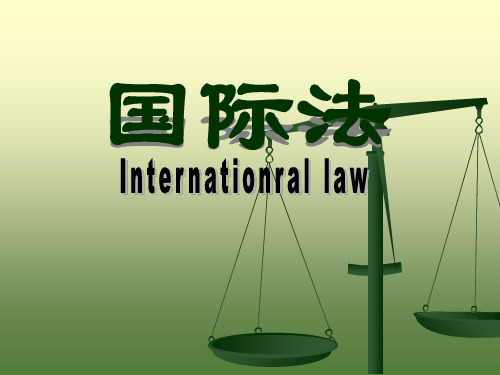
2020/12/13
国际法
15
大陆法系各国的法院组织
大陆法各国的法院组织虽然各有特点,但都 有一些共同之处.主要表现在: 法院的层次基本相同;各国除普通法院以外, 都有一些专门法院与普通法院同时并存. 各国法院基本上都分为三级,即第一审法院、 上诉法院和最高法院.
2020/12/13
国际法
16
普通法系的概念和特征
2020/12/13
国际法
24
2.反共,也可以说是冷战意识
在美国,反共产党、反共产主义和社会主 义,是不需要任何理由的,反本身就是理 由。马克思主义归根到底就是一句话:反 对资本奴役劳动,最终要消灭资本,解放 劳动,未来要让劳动者自由联合,自己为 自己劳动。所以,共产党传承马克思,美 国则是最崇拜资本、最强大的资本主义国 家,谁有资本、谁的资本大,谁就有权利, 谁可以说了算,没有资本就没有发言权。
2020/12/13
国际法
19
"先例约束力的原则"
1)上议院的判决是具有约束力的先例,对全国各级审判机关 都有约束力, 一切审判机关都必须遵循,但上议院可不受其先例的约束. (2)上诉法院的判决可构成对下级法院有约束力的先例,而 且对上诉法院本
身也有约束力. (3)高级法院的每一个庭的判决对一切低级法院有约束力, 对高等法院的其
2020/12/13
国际法
7
国际条约的种类
条约又分双边条约和多边条பைடு நூலகம்(又称公约)
2020/12/13
国际法
8
(二)国际惯例
国际惯例,是指国际经济法主体重复类似的行为而上升为 对其具有拘束力的规范. 法律上的惯例与习惯是有本质的不同的,前者一旦被当事 人加以采用,便对该当事人具有法律拘束力,后者只是一种 习惯的行为.从这个意义上说,虽然国际惯例没有普遍的约 束力,无法与国际公约的效力相比,但在某些具体的当事人 之间却有像国际公约一样的强制力.有些国际惯例已经被 某些国家纳入其国内的成文法,从而具有了法律的普遍约 束力.还有些国家的国内法规定,国际惯例的适用无须当事 人明示表示同意.由此可见,目前国际惯例与国际公约在强 制力上的这种区别已经被渐渐淡化了,采用国际惯例已经 成为国际上的一种趋势.我国对国际商事活动中的国际惯 例,历来给予高度的重视,并严格予以遵守.
《国际商法》PPT课程课件全编精选全文

国际条约(或公约)对缔约国具有法律约束力,实践中,各国为了奉行条约必须信
守的古老法律原则,一般将其相关的内容在国内法中予以体现。但是,国际商法
在本质上属于私法范畴,当事人的意思自治原则在一定程度上可以减损国际公约
(或条约)的效力,由此致使其不具有绝对的强制执行力。例如,各国国情不同,在
英美法系
(二)英国法的结构、特点和渊源
3.英国的法院组织体系
➢ 英国的法院体系比较复杂,有高级法院和低级法院两类。前者包括上议院(枢密院司
法委员会)、上诉法院和高等法院三种,后者包括王冠法院、郡法院和治安官法庭三
种。郡法院和治安官法庭作为英国最低一级的法院,分别审理辖区内争议标的在5
除法国、德国外,许多欧洲大陆国家如瑞士、意大利、奥地利、荷
兰、卢森堡、比利时、西班牙、葡萄牙、瑞典等都适用大陆法系。
另外,曾受大陆法系国家殖民统治过的拉丁美洲、非洲,以及近东
的一些国家也实行大陆法系,英美法系国家中的个别地区,如美国
的路易斯安那州和加拿大的魁北克省,也实行大陆法系。另外,日
本、土耳其等国,以及我国台湾地区,也引入了大陆法系。
各种方式把商法纳入
本国的国内法,使之
成为国内法的一部分,
从而使商法失去了它
原有的国际性。
第二次世界大战后,
特别是20世纪60年
代以后,随着世界生
产力的增长,各国之
间的经济联系日益密
切,经济生活越来越
国际化,互相依赖的
程度也大大增强。
洲地中海沿岸是世
界各国贸易的中心,
意大利的威尼斯、
热那亚等一些城市
则是这一贸易中心
➢ 英国法分为普通法与衡平法,这种二元性结构是英国法的一个主要特点。
国际贸易法律术语
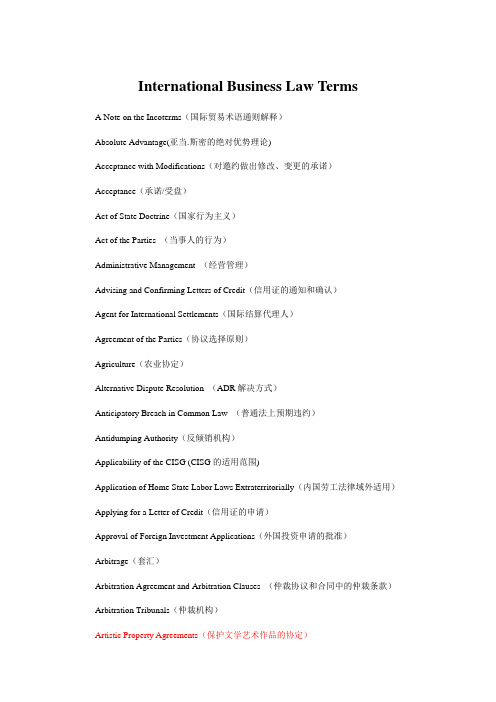
International Business Law TermsA Note on the Incoterms(国际贸易术语通则解释)Absolute Advantage(亚当.斯密的绝对优势理论)Acceptance with Modifications(对邀约做出修改、变更的承诺)Acceptance(承诺/受盘)Act of State Doctrine(国家行为主义)Act of the Parties (当事人的行为)Administrative Management (经营管理)Advising and Confirming Letters of Credit(信用证的通知和确认)Agent for International Settlements(国际结算代理人)Agreement of the Parties(协议选择原则)Agriculture(农业协定)Alternative Dispute Resolution (ADR解决方式)Anticipatory Breach in Common Law (普通法上预期违约)Antidumping Authority(反倾销机构)Applicability of the CISG (CISG的适用范围)Application of Home State Labor Laws Extraterritorially(内国劳工法律域外适用)Applying for a Letter of Credit(信用证的申请)Approval of Foreign Investment Applications(外国投资申请的批准)Arbitrage(套汇)Arbitration Agreement and Arbitration Clauses (仲裁协议和合同中的仲裁条款)Arbitration Tribunals(仲裁机构)Artistic Property Agreements(保护文学艺术作品的协定)Artistic Property Agreements(文学艺术品产权协定)Assignment(合同权利转让)Attorney-General(法律总顾问)Automatic Dissolution (自动散伙)Average Clauses(海损条款)Avoidance(解除)Bank Deposits(银行储蓄)Bases of Income Taxation(所得税的征税依据/基础)Battle of the Forms(形式上的分歧/冲突)Bills of Lading (提单)Branch Banking(银行的分支机构)Business Form and Registered Capital (企业形式和注册资本)Business Forms(商业组织形式)Buyer's Remedies(买方可以采取的救济措施)Carriage of Goods by Air(航空货物运输)Carriage of Goods by Sea and Marine Cargo Insurance(海上货物运输及其保险)Carrier's Duties under a Bill of Lading(在提单运输方式下承运人的责任/义务)Carrier's Immunities(承运人责任/义务的豁免)Cartels (企业联合/卡特尔)Categories of Investment Projects (外国投资的项目类别)Charterparties (租船合同)Charterparties by Demise (光船出租合同)China's Fundamental Policies for Encouraging Foreign Investments (中国大陆鼓励外国投资的基本政策)Choosing the Governing Law(准据法的选择)CIF (cost, insurance and freight) (port of destination) (CIF成本\保险费加运费付至指定的目的港)Civil Law (民法法系)Clearance and Settlement Procedures(交换和转让程序)Collection of Documentary Bills Through Banks(银行跟单托收)Commercial Arbitration (国际商事仲裁)Commodity Arrangements(初级产品/农产品安排)Common Enterprise Liability(企业的一般责任)Common Law (普通法系)Common Procedures in Handling Bills of Exchange (汇票处理的一般程序)Common Stock (股票)Company Taxpayers(公司/法人企业纳税人)Comparative Advantage(大卫.李嘉图的比较优势理论)Comparison of Municipal Legal Systems(内国法系的比较研究)Compensation for Winding up (清算补偿)Comprehensive Agreements (综合性的协定)Compulsory Licenses(强制许可)Computation of Income(收入计算)Conformity of Goods(与合同约定相符合的货物)Consent to the Jurisdiction of the Host State(给予东道国管辖权的许可/同意)Consideration in Common Law(英美法上的对价)Contemporary International Trade Law(当代国际贸易法)Contract Law for the International Sale of Goods(国际货物销售合同法)Contract Liability of the Agent (代理人的合同义务)Contract Liability of the Principal (委托人的合同义务)Contractual Issues Excluded from the Coverage of CISG(排除在CISG适用范围之外的合同问题)Copyrights (著作权/版权)Council for Trade-Related Aspects of Intellectual Property Rights(与知识产权有关的理事会)Coverage of Tax Treaties(税收条约的覆盖范围)Creation of Agency (代理创立)Creditors of Partners(合伙人的债权人)Currency Crises: The Role of Monetary Policy(金融危机:货币政策的作用与地位)Currency Exchange Obligations of IMF Member States(国际货币基金组织成员国在外汇交易中的义务)Currency Exchange(外汇交易)Currency Support(资金/财政援助)Custom(习惯)Customs Valuation(海关估价协定)Debt Securities (债券)Decision Making within the WTO(WTO内部决定作出机制)Deficiencies in the GATT 1947 Dispute Process (关税及贸易总协定1947争端解决程序的不足)Definite Sum of Money or Monetary Unit of Account(确定货币的总额或者计价的货币单位)Definition and Special Features(定义和特征)Delayed Bills of Lading(提单迟延)Denial of Justice(司法不公)Development Banks (发展银行)Direct Effect(直接效力)Direct Exporting(直接出口)Directors' and Officer's Duties to the Corporation(董事和经理/首席执行官对公司的义务)Dispute Settlement(争端的解决)Dissolution by Agreement (协议解散)Dissolution by Court Order (依法院令状散伙)Dissolution of the Partnership (散伙)Distribution of Earnings and Recovery of Investments (收入分配和投资回收)Distribution to Shareholders (红利分配权)Doctrine of Imputability (归责原则)Documentary Formalities(文本格式要求)Double Taxation Provision(双重征税的规定)Double Taxation(双重征税)Duress (胁迫行为)Duties of Agent and Principal (代理人和委托人的义务)Duties of Agent to Principal (委托人的义务)Duties of Principal to Agent (代理人、的义务)Duty of Care in Partnership Business(对合伙事务尽心看护义务)Duty of Loyalty and Good Faith (忠诚和诚信义务)Effectiveness of an Offer(邀约/发盘的效力)Employment Laws in the European Union(欧洲联盟雇佣/劳工法)Employment Standards of the Organization for Economic Cooperation and Development(经济合作与发展组织雇佣/劳工标准)Enforcement of Exchange Control Regulations of IMF Member States(国际货币基金组织成员国对外汇交易管理规则的履行)Enforcement of Foreign Arbitral Awards in the People's Republic of China (在中华人民共和国境内外国仲裁裁决的执行)Enforcement of Foreign Judgment (外国法院判决的执行)Enforcement of Partnership Rights and Liabilities(执行合伙事务的权利和责任)Enforcement of Securities Regulations Internationally(国际证券规则的执行)Environmental Regulation(环境规则)Escape Clause(免责条款)Euro-currency Deposits(欧洲货币储蓄)European Communities - Regime for the Importation, Sale, and Distribution of Bananas(欧洲共同体对于香蕉的进口、销售和分销的管理)European Union Law on Trade in Services(欧洲联盟关于服务贸易的法律)Exceptio non Adimpleti Contractus in Civil Law (大陆法上履行契约之抗辩权)Exceptions(例外)Exclusive Licenses(独占许可)Excuses for Non-performance (不履行的免责)Excuses for Nonperformance(不履行合同的抗辩/借口)Exemptions for New Members from IMF Member State Currency Exchange Obligations(国际货币基金组织新成员国在外汇交易中义务的免除)Export Restrictions (出口限制)Exporting(出口)Expropriation(征收)Extraterritorial Application of U. S. Securities Laws(美国证券法域外的适用问题)Failure to Exhaust remedies(没有用尽法律救济)Fault and Causation(过错和因果关系)Finance Ministry(财政部)Finance of International Trade(国际贸易的结算/支付)Financing Foreign Trade(对外贸易的价金支付)FOB (free on hoard) (port of shipment)(FOB装运港船上交货)Force Majeure Clauses (不可抗力条款)Foreign Investment Guarantees(外国投资的担保)Foreign Investment Laws and Codes(外国投资法)Formal and Informal Application Process(正式和非正式申请程序)Formation of the Contract(合同的成立)Forsed Endorsements(虚假背书)Fraud Exception in Letters of Credit Transaction (信用证交易的欺诈例外)Frauds on Bills of Lading(提单欺诈)Fraudulent Misrepresentation(受欺诈的误解)Free Zones(保税区/自由贸易区)Fundamental Breach(根本违约)GATS Schedules of Specific Commitments(服务贸易总协定减让表中的特别承诺)General Agreement on Trade in Services (服务贸易总协定)General Requirements and Rights of the Holder in Due Course(票据持有人的一般要求和权利)General Standards of Performance(履行的一般标准)Geographic Limitations(地区限制)Government Controls over Trade (政府对贸易的管制)Government Guarantees(政府担保)Governmental Interest(政府利益原则)Governmental Sources of Capital(官方资金)Grant Back Provisions(回授的规定)Home state Regulation of Multinational Enterprises(本国对跨国企业的管理)Host State Regulation of Multinational Enterprises(东道国对跨国企业的管理)Illegality and Incompetency(行为不合法性与主体不适当资格的认定)IMF "Conditionality"(国际货币基金组织的制约性)IMF Facilities(国际货币基金组织的机制)IMF Operations(国际货币基金组织的运作)IMF Quotas(国际货币基金的份额)Immunities of States from the Jurisdiction of Municipal Courts(国家豁免于内国法院的管辖权)Import-Licensing Procedures(进口许可证程序协定)Income Categories(收入分类)Income Tax Rates(所得税税率)Income Taxes(所得税)Independence Principles and Rule of Strict Compliance (信用证独立原则和单证严格相符规则)Indirect Exporting(间接出口)Industrial Property Agreements (保护工业产权的协定)Innocent Misrepresentation(因无知的误解)Inquiry(调查)Insider Trading Regulations(内幕交易规则)Insurance Cover (保险范围)Integration of Company and Personal Income Taxes(公司和个人所得税的征收)Intellectual Property Right Law (知识产权法)International Center for the Settlement of Investment Disputes (解决投资争端国际中心)International Commercial Dispute Settlement (国际商事争端的解决)International Court of Justice (海牙联合国国际法院)International Factoring (国际保理)International Franchising(国际特许经营权)International Labor Standards(国际劳工标准)International Licensing Agreement(国际许可证协议)International Licensing Agreements (国际许可证协定)International Model Law(国际示范法)International Organizations(国际组织)International Persons(国际法主体)International Rules for the Interpretation of Trade Terms(国际贸易术语解释通则) International Trade Customs and Usages(国际贸易惯例和习惯)International Treaties and Conventions(国际条约和公约)International Tribunals (国际法庭)Interpreting of the CISG (CISG的解释)Invitation Offer (要约邀请/要约引诱/询盘)Involuntary Dissolution (非自愿解散)Issuance of Securities(证券发行)Jurisdiction and Venue (管辖权和法院地)Jurisdiction in Civil Cases(民事案件的管辖权)Jurisdiction in Criminal Cases(刑事案件的管辖权)Know-how (技术秘密/专有技术)Lack of Genuine Link(缺乏真实的联系)Lack of Nationality(无国籍)Lack of Standing(身份不明)Law Applicable to Letters of Credit (调整信用证的法律)Law of Foreign Investment Enterprises of China (中国的外商投资企业法)Law of the People's Republic of China on Chinese Foreign Contractual Joint Ventures(中华人民共和国中外合作企业法)Law of the People's Republic of China on Chinese Foreign Equity Joint Ventures (中华人民共和国中外合资企业法)Law of the People's Republic of China on Foreign Capital Enterprises(中华人民共和国外资企业法)Legal Characteristics (定义和法律特征)Legal Structure of the WTO (世界贸易组织的法律框架)Legal System of International Business(国际商事的法律体系)Letters of Credit (L/C)(信用证)Liabilities of Makers, Drawers, Drawees, Endorsers and Accommodation Parties(票据制作人、出票人、付款人、背书人、代发人/担保人的责任)Liability for Environmental Damage(环境损害责任)Liability Limits(承运人责任/义务的限制)Licensing Regulations(许可证制度)Limitations on Foreign Equity(外国投资的资金比例限制)Limitations on the Excuses That Drawers and Makers Can Use to Avoid Paying Off a Bill or Note 661 (票据制作人、出票人拒绝付款借口的限制)Liquidated Damages (约定的损害赔偿金)Liquidation (清算)Maintaining Monetary Value(维护币值稳定)精选文库Major Principles of GATT 1994(关税及贸易总协定1947的主要原则)Marine Insurance Policies and Certificates (海运保险单和证书)Maritime Insurance(海运保险)Maritime Liens (留置权)Means of Delivery(根据交付方式)Mediation(调停/调解)Membership(成员)Memorandums of Understanding(谅解备忘录)Methods of Investment Contribution(出资方式)Mini-trial (模拟审判方式)Miscellaneous Taxes(混杂的,各种各样的税)Misrepresentation(误解)Mixed Sales(混合销售)Modification of Foreign In vestment Agreements(外国投资协议的修改)Money and Banking(货币与金融)Monopoly Control Authority (反垄断机构)Most Significant Relationship(最密切联系原则)Most-favored-nation Treatment (最惠国待遇原则)Movement of Workers(劳工流动)Multilateral Investment Guaranty Programs(多边投资担保计划/安排)Multilateral Trade Agreements(多边贸易协定)Multilateral Trade Negotiations (多边贸易谈判)Multinational Enterprise(跨国企业)Municipal Courts(国内法院的实践)Municipal Legal Systems(内国法系)National Foreign Investment Policies(内国的外国投资政策)National Investment Guarantee Programs(内国/国家投资担保计划/安排)National Law(国内法)National Monetary Systems(国内金融/货币体系)National Treatment (国民待遇原则)Nationality Principle(国籍原则)Negligent (innocent) Misrepresentation(因疏忽的误解)Negotiability of Bills and Negotiability of Notes(可流通的汇票和可流通的本票)Negotiation (谈判,议付)Noncompetition Clauses(限制竞争条款)Nondiscrimination(非歧视原则)Nonimputable Acts(免责行为)Nontariff Barriers to Trade(非关税贸易壁垒)Nonwrongful Dissolution (非不法原因散伙)Objections(异议)Obligations of the Parties (当事人各方的义务)Obligations of the Seller and the Buyer (买卖双方的合同义务)Offer (要约/发盘)Operation of Law (法律的原因而终止)Operational Reviews(营业审查)Opting In and Out(加入和退出)Organization of the IMF(国际货币基金组织的机构)Organizations Affiliated with the United Nations(联合国的相关组织)Overseas Private Investment Corporation(海外私人投资公司的案件)Parent Company(母公司)Passing of Property (产权的转移)Passing of Risk (风险的转移)Patents (专利权)Payable on Demand or at a Definite Time(付款要求或者在指定的付款时间)Payment of the Price(支付价款)Penalties for Noncompliance(对于不遵守法规的处罚)Perils and Losses(保险危险和损失)Persons Immune from Taxation(个人所得税的免除)Piercing the Corporate Veil(普通法上揭开公司的面纱/大陆法上公司人格否认原则)Place for Delivery(交付的地点)Post -Termination Relationship(代理终止后的有关问题)Powers during Winding up (合伙人在清算过程中的权力/权利)Practices and Usages(交易习惯和商业惯例)Preemption(先买权/优先权)Preshipment Inspection(装运前检验协定)Price-Fixing(定价)Private Insurers(私人/商业保险)Private Sources of Capital(私人资金)Products Liability Laws(产品质量法)Promissory Notes(本票)Promoter of International Monetary Cooperation(国际金融合作的促进者)Promoters(公司的发起人)Protection of Natural Resources(自然资源的保护)Protection of Subsidiaries(分支机构的保护制度)Protection of Workers' Rights by the Council of Europe(欧洲理事会关于劳工权利的保护)Protection through Tariffs(关税保护)Proving Foreign Law(外国法的查明)Provisions Governing Trade in Services in the North American Free Trade Agreement (北美自由贸易区协定中关于服务贸易的规定)Quality Controls(质量控制)Quantity and Field-of-Use Restrictions(对数量和使用领域的限制)Recognition and Enforcement of Awards (仲裁裁决的承认和执行)Recognition of Foreign Judgments(外国裁决的承认)Refusal to Exercise Jurisdiction(拒绝执行管辖权)Regional and International Development Agencies(区域性和国际性发展机构)Regional Integration(区域联合)Regional Intergovernmental Regulations on Labor(区域性政府间关于劳工的规定)Regional Intergovernmental Regulations on Trade in Services(关于服务贸易的区域性政府间管理规则)Regional Monetary Systems(区域性金融体系)Regulation of Foreign Workers(外籍员工的的管理规定)Regulation of Pollution(防止污染规则)Relief(救济、赔偿)Remedies Available to Both Buyers and Sellers(买卖双方都可以采取的救济措施)Remedies for Breach of Contract(违反合同的救济)Requests for Specific Performance(要求继续/特定履行)Residency Principle(居住地原则)Restrictions on Research and Development(对技术研究和发展的限制)Restrictions That Apply after the Expiration of Intellectual Property Rights(知识产权保护期满后应用的限制)Restrictions That Apply after the Expiration of the Licensing Agreement(知识产权使用许可合同期满后应用的限制)Right to Compensation (主张赔偿的权利)Rights and Duties (权利与义务)Rights and Responsibilities of Beneficiaries(收款人/收益人的权利与义务)Rights and Responsibilities of the Account Party(付款人/信用证帐户申请人的权利与义务)Rules of Origin(原产地规则)Rules of Private International Law(国际私法规则)Safeguards(保障措施协定)Sanitary and PhytosanitaryMeasures(卫生与植物卫生措施协定)Scope and Coverage of GATT 1947 and GATT 1994 (关税及贸易总协定1947和1994文本的调整范围)Screening Foreign Investment Applications(对外国投资申请的筛选/审查)Sectoral Limitations(行业/部门限制)Securities and Exchange Commission(证券交易委员会)Securities Exchanges (证券交易所)Securities Regulations(证券规章)Seller's Obligations(卖方的义务)Seller's Remedies(卖方可以采取的救济措施)Settlement of Disputes between ILO Member States(国际劳工组织成员国之间争端的解决)Settlement of Disputes between Intergovernmental Organizations and Their Employees (政府间国际组织与它的雇员之间争端的解决)Settlement of Disputes in International Tribunals(在国际法庭解决争端)Settlement of Disputes in Municipal Courts(内国法院的争端解决途径)Settlement of Disputes through Diplomacy(通过外交途径解决争端)Settlement of Disputes through Municipal Courts (通过内国法院解决国际商事争端)Shareholders' Inspection and Information Rights(股东的监督和知情权)Shareholders' Lawsuits (股东的诉权)Shareholders' Meetings(股东会议/大会)Shareholders' Rights and Liabilities (股东的权利和责任)Sharp Practices (欺诈行为)Signed by the Maker or Drawer(票据制作人或者出票人签名)Source Principle(税收发生来源原则)Sources of Corporate Financing (公司资本的来源)Sources of Foreign Investment Law of China (中国外国投资法的渊源)Sources of International Business Law(国际商法的渊源)Sources of International Law(国际法的渊源)Sources of Investment (投资范围)Sovereign or State Immunity(国家主权豁免)Specialization(国际分工专门化)Standard of Care(给予外国人的待遇/关照标准)Start-Up Standards(设立标准)State Responsibility(国家责任)Statements and Conduct of the Parties(当事人的陈述和行为)Statutory Choice-of-Law Provisions (强制选择条款)Structure of the WTO(WTO的组织结构)Subordinate Business Structures(商业分支机构)Subsidies and Countervailing Measures(补贴与反补贴措施协定)Supervision of Foreign Investment(外国投资的监管)Supreme Court Decision(最高法院的裁决)Systems for Relief from Double Taxation(避免双重征税的救济体制)Takeover Regulations(接管/收购规则)Taking Delivery(接受交付)Tariff-based Import Restriction (约束进口关税)Tariffs(关税)Tax Avoidance(避税)Tax Evasion(逃税)Tax Incentives (税收激励)Tax Sparing(节税)Tax Treaties(税收条约)Taxation(税收)Taxpayers(纳税人)Technical Barriers to Trade(贸易的技术壁垒)Technology Transfer(技术转让)Termination of an Agency (代理的终止)Termination of Corporations (公司的终止)Territorial Restrictions(地区限制)Textiles and Clothing(纺织品和服装协定)The Acceptance(承诺/受盘)The Administrative Discretion of Screening Authorities(筛选/监管机构的管理权)The Anglo-American Common Law System(普通法系或者英美法系)The Applicable Procedure Law (应用的程序法)The Applicable Substantive Law(应用的实体法)The Bank for International Settlements(巴塞尔国际清算银行)The Bill of Exchange(汇票)The Board of Directors (董事会)The Bretton Woods System(布雷敦森林体系)The Business Form(商业组织形式)The Buyer's Right to Avoid the Contract(买方解除合同的权利)The Central Bank(中央银行)The Choice of Money(货币的选择)The Convention on Insider Trading(内幕交易的公约)The Drafting of the CISG(CISG的起草)the Economic Globalization (经济全球化)The Final Act Embodying the Results of the Uruguay Round of Multilateral Trade Negotiations(乌拉圭回合多边贸易谈判结果的最后文本)The Foreign Exchange Market(外汇交易市场)The Founding of GATT(关税及贸易总协定的成立)The Framework Agreement(协定的框架)The General Agreement on Tariffs and Trade(关税及贸易总协定)The Importance of the Separate Legal Identity of Juridical Entities(跨国企业作为拥有独立法律地位的实体之重要性)The Interbank Deposit Market(银行间的储蓄市场)The International Labor Organization(国际劳工组织)The International Monetary Fund(国际货币基金组织)The International Standard(国际待遇/标准)The International Transfer of Intellectual Property(工业产权的国际转让)The Islamic Law System (伊斯兰法系)The Law Governing Bills of Exchange (调整汇票的法律制度)The Law of Agency (国际商事代理法)The Making of International Law (国际法的构成)The National Standard(国民待遇/标准)The Negotiation and Transfer of Bills and Notes(票据权利的转让和背书转让)The Obligations of Banks(银行的义务/责任)The Principal Characteristics(基本特征)The Role of Banks in Collecting and Paying Negotiable Instruments(银行在可流通票据的托收和付款中的角色)The Roman-Germanic Civil Law System(大陆法系或者罗马日耳曼法系)The Scope of International Law in Actual Practice (实践中国际法的范围)The Subordinate Structure(分支结构)The Transfer of Money(货币转移)The Turning Over of Documents(交付与货物有关的单证)The Uruguay Round(乌拉圭回合)The Value of Money(币值)The World Trade Organization (WTO) (世界贸易组织)The WTO Agreement (WTO协定)Third Party Relations of the Principal and the Agent (与委托人和代理人有关的第三人)Third-Party Claims and Personal Injuries(第三方的权利和人身伤害)Third-Party Rights (Himalaya Clause)(第三方的权利----喜玛拉亚条款)Time Charterparties (定期租船合同)Time for Delivery (交付的时间)Time Limitations(时效)Trade Barriers (贸易壁垒)Trade in Goods(货物贸易)Trade Liberalization Through Cooperation (通过合作实现贸易自由化)Trade Policy Review(贸易政策评审机制)Trade Terms(贸易术语)Trademarks(商标权)Trade-Related Investment Measures(与贸易有关的投资措施协定)Trading in Securities (证券交易)Transactions Covered in CISG(CISG适用的交易范围)Transnational Organized Labor(有组织的跨境服务的劳工)Transparency(透明度)Treaties and Conventions(条约和公约)Trial Court Decision(初等法院的裁决)Turnover Taxes(流转/交易税)Tying Clauses(搭售条款)Unconditional Promise or Order to Pay(无条件的付款承诺和要求)Unfair Competition Laws(不正当竞争法)UNIDROIT Principles of International Commercial Contracts (PICC)(国际统一私法协会国际商事合同通则,简称PICC)精选文库United Nations Convention on Contracts for the International Sale of Goods (CISG)(联合国国际货物销售合同公约,简称CISG)Validity and Formation of International Sale of Contracts(国际货物销售合同的成立和效力)Visas(签证)Voyage Charterparties (航次租船合同)Waivers(让渡、放弃)Winding Up (合伙清算)World Intellectual Property Organization(世界知识产权组织)World Trade Organization Dispute Settlement Procedures(世界贸易组织争端解决机制)Wrongful Dissolution (不法原因散伙)WTO Antidumping Agreement (世界贸易组织反倾销协议)WTO Dispute Settlement Procedures(世界贸易组织的争端解决程序)-- 21。
如何翻译法律英语文献补充材料部分参考答案
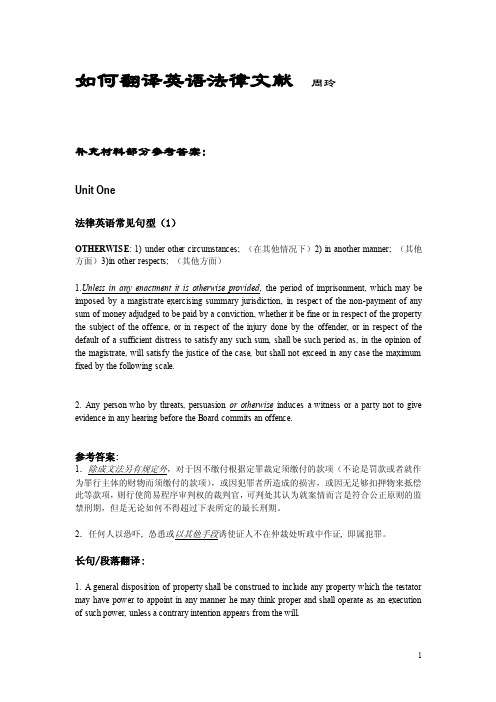
如何翻译英语法律文献周玲补充材料部分参考答案:Unit One法律英语常见句型(1)OTHERWISE: 1) under other circumstances; (在其他情况下)2) in another manner; (其他方面)3)in other respects; (其他方面)1.Unless in any enactment it is otherwise provided, the period of imprisonment, which may be imposed by a magistrate exercising summary jurisdiction, in respect of the non-payment of any sum of money adjudged to be paid by a conviction, whether it be fine or in respect of the property the subject of the offence, or in respect of the injury done by the offender, or in respect of the default of a sufficient distress to satisfy any such sum, shall be such period as, in the opinion of the magistrate, will satisfy the justice of the case, but shall not exceed in any case the maximum fixed by the following scale.2. Any person who by threats, persuasion or otherwise induces a witness or a party not to give evidence in any hearing before the Board commits an offence.参考答案:1.除成文法另有规定外,对于因不缴付根据定罪裁定须缴付的款项(不论是罚款或者就作为罪行主体的财物而须缴付的款项),或因犯罪者所造成的损害,或因无足够扣押物来抵偿此等款项,则行使简易程序审判权的裁判官,可判处其认为就案情而言是符合公正原则的监禁刑期,但是无论如何不得超过下表所定的最长刑期。
商务英语阅读(专业篇) Unit 8

International Business Law International business law regulates various affairs of international business transaction and international commercial organizations. International business law includes usually: contract law, sales law, company law, negotiable instrument law, marine law, insurance law,etc. Business law is born and develops with the development of commodity economy. Historically, business law came into being during the ancient Roman period(B.C.700) as early as 2600 years ago, but at that time business law was only a part of private law. Modern international law refers chiefly to European business law which originated from “Law merchant” of Middle-Ages.
国际商法的总结
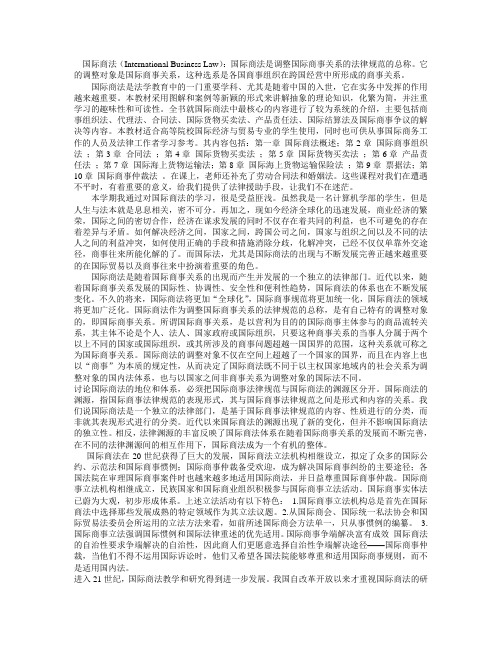
国际商法(International Business Law):国际商法是调整国际商事关系的法律规范的总称。
它的调整对象是国际商事关系,这种选系是各国商事组织在跨国经营中所形成的商事关系。
国际商法是法学教育中的一门重要学科、尤其是随着中国的入世,它在实务中发挥的作用越来越重要。
本教材采用图解和案例等新颖的形式来讲解抽象的理论知识,化繁为简,并注重学习的趣味性和可读性。
全书就国际商法中最核心的内容进行了较为系统的介绍,主要包括商事组织法、代理法、合同法、国际货物买卖法、产品责任法、国际结算法及国际商事争议的解决等内容。
本教材适合高等院校国际经济与贸易专业的学生使用,同时也可供从事国际商务工作的人员及法律工作者学习参考。
其内容包括:第一章国际商法概述;第2章国际商事组织法;第3章合同法;第4章国际货物买卖法;第5章国际货物买卖法;第6章产品责任法;第7章国际海上货物运输法;第8章国际海上货物运输保险法;第9章票据法;第10章国际商事仲裁法。
在课上,老师还补充了劳动合同法和婚姻法。
这些课程对我们在遭遇不平时,有着重要的意义,给我们提供了法律援助手段,让我们不在迷茫。
本学期我通过对国际商法的学习,很是受益匪浅。
虽然我是一名计算机学部的学生,但是人生与法本就是息息相关,密不可分。
再加之,现如今经济全球化的迅速发展,商业经济的繁荣,国际之间的密切合作,经济在谋求发展的同时不仅存在着共同的利益,也不可避免的存在着差异与矛盾。
如何解决经济之间,国家之间,跨国公司之间,国家与组织之间以及不同的法人之间的利益冲突,如何使用正确的手段和措施消除分歧,化解冲突,已经不仅仅单靠外交途径,商事往来所能化解的了。
而国际法,尤其是国际商法的出现与不断发展完善正越来越重要的在国际贸易以及商事往来中扮演着重要的角色。
国际商法是随着国际商事关系的出现而产生并发展的一个独立的法律部门。
近代以来,随着国际商事关系发展的国际性、协调性、安全性和便利性趋势,国际商法的体系也在不断发展变化。
国际商法课件第一章

The Meaning of Commercial
According to UN Commercial Arbitration:(联合国国际商事仲裁示范法)
The term ‘commercial’should be given s wide interpretation so as to cover matters arising from all relationships of a commercial nature, whether contractual or not.
你所理解的国际商法? Why Should You Study Law?
Why Should You Study Law?
The benefits from mastering the knonwledge and skills of law.
In the domain of business, just as the pricing practices of competitors must be taken into account in formulating long- or short-term strategy, so must the legal environment of business be considered.
在商务活动中,制定长期或短期战略时,就像必须考虑竞争 者的定价情况一样,法律环境必须加以考虑。
Why Should You Study Law?
For example, in considering whether to entering a foreign market, a manager must determine whether contracts entered into in that nation can be enforced, whether intellectual property such as trade secrets, trademarks, and patents can be protected, and whether taxation and the threat of expropriation present intolerable risks.
chapter 1 国际商法概述解析
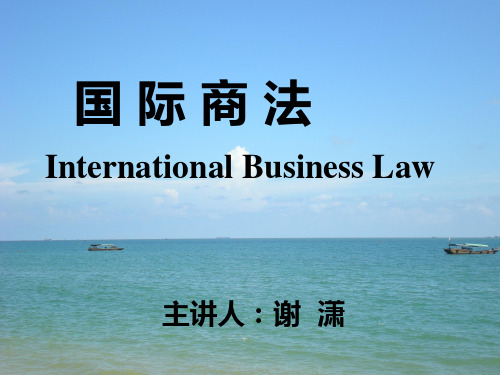
三、民法与商法的关系
调整范围局限于商事关系 营利性是商事行为的主要特征 特别法优先于普通法
四、我国的民商立法概况 P13-14
五、中国涉外商事法律制度P14-15
案例分析 P15-16
一、案情介绍: Gaskin V. Stumm Handel GMBH
二、思考角度: 1、真实意思表示 VS 合同内容约定 2、欺诈 or 误解 or 疏忽 3、合同约定 VS 法律规定
2、姜作利:《国际商法》(第三版)
ห้องสมุดไป่ตู้
法律出版社2012年版
3、张圣翠:《国际商法》
上海财经大学出版社2013年版
4、王传丽:《国际经济法》
高等教育出版社 2012年版
Chapter One
Introduction to International Business Law
Key Terms
International business law 国际商法
第二节 渊 源(形式渊源)
一、国际商事条约 Conventions 双边条约和多边条约
实体法条约和程序法条约
二、国际商事惯例Customs 一般做法general practice
习惯usage 惯例custom
三、各国的商事法Laws
大陆法系和英美法系
——辅助性渊源:判例Case、学说Theory
第三节 中国民商法概述
一、民法 Civil Law 市民法jus civile 万民法jus gentium
1、概念 调整平等主体间的财产关系和人身关系 2、调整对象 财产关系:物质性财产和非物质性财产 人身关系:人格权和身份权 3、基本原则 平等、自愿、公平、诚信、守法和公序良俗
国际商法(双语)-教学大纲

《国际商法》教学大纲课程编号100183A课程类型:□通识教育必修课□通识教育选修课□专业必修课 专业选修课□学科基础课总学时:48讲课学时:48实验(上机)学时:0学分:3适用对象:国际经济与贸易/商务英语先修课程:无一、教学目标本课程属于首都经济贸易法学院对外院系开设的专业选修课,旨在培养具有国际视野,熟悉国际商事交易程序和相关法律规则的高层次、复合型应用人才。
通过本课程的教学,学生不仅要掌握国际商事交易中问题的解决程序和有关法规,而且还要具备运用理论知识分析问题和解决问题的能力。
具体而言,应达到以下三个目标:目标1:了解国际商法的基本原理,着重掌握国际商法中合同法和货物买卖法的理论知识;目标2:掌握国际商事活动范围内问题的解决程序和有关法规,重点掌握美国和英国的基本商事交易的法律制度,同时熟悉当代中国法律制度。
目标3:具备运用理论知识分析问题和解决问题的能力,并能够运用所学知识参与国际商事活动,分析国际商事纠纷,综合处理国际贸易活动的能力。
二、教学内容及其与毕业要求的对应关系本课程主要包括商事组织法、商事代理法、国际合同法、国际买卖法、知识产权法、产品责任法、国际商事争端解决等内容。
授课过程中,着重掌握国际商法中商事组织法和合同法的理论知识。
学生课前应对教师所发放的资料进行预习,以提升学校效果。
课堂上,拟采用案例教学法和课堂讨论法,通过具体案例的分析,引导学生发现问题并进行思考。
通过重点知识点讲解和课堂分组练习的方式,借助“雨课堂”等软件让学生能够当堂回答问题,提升学生课堂参与性和学习的自主性。
在教学中,针对学生特点,注重国际商法的基本理论和基础知识和基本技能的学习和训练,突出难点和重点,理论联系实际,紧密联系业务实际,突出针对性和实效性。
同时,课后会给学生留适当练习题,以便巩固所学知识。
本课程属于毕业要求中的专业选修课之涉外类,采用双语授课,旨在贯彻我校对复合型人才的培养要求,提升涉外实务方向学生的法律英语水平和涉外商事法律纠纷处理技能。
国际商法
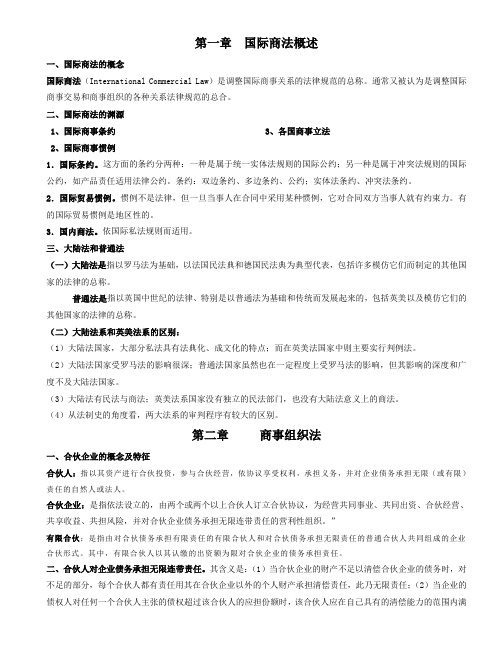
第一章国际商法概述一、国际商法的概念国际商法(International Commercial Law)是调整国际商事关系的法律规范的总称。
通常又被认为是调整国际商事交易和商事组织的各种关系法律规范的总合。
二、国际商法的渊源3、各国商事立法1、国际商事条约2、国际商事惯例1.国际条约。
这方面的条约分两种:一种是属于统一实体法规则的国际公约;另一种是属于冲突法规则的国际公约,如产品责任适用法律公约。
条约:双边条约、多边条约、公约;实体法条约、冲突法条约。
2.国际贸易惯例。
惯例不是法律,但一旦当事人在合同中采用某种惯例,它对合同双方当事人就有约束力。
有的国际贸易惯例是地区性的。
3.国内商法。
依国际私法规则而适用。
三、大陆法和普通法(一)大陆法是指以罗马法为基础,以法国民法典和德国民法典为典型代表,包括许多模仿它们而制定的其他国家的法律的总称。
普通法是指以英国中世纪的法律、特别是以普通法为基础和传统而发展起来的,包括英美以及模仿它们的其他国家的法律的总称。
(二)大陆法系和英美法系的区别:(1)大陆法国家,大部分私法具有法典化、成文化的特点;而在英美法国家中则主要实行判例法。
(2)大陆法国家受罗马法的影响很深;普通法国家虽然也在一定程度上受罗马法的影响,但其影响的深度和广度不及大陆法国家。
(3)大陆法有民法与商法;英美法系国家没有独立的民法部门,也没有大陆法意义上的商法。
(4)从法制史的角度看,两大法系的审判程序有较大的区别。
第二章商事组织法一、合伙企业的概念及特征合伙人:指以其资产进行合伙投资,参与合伙经营,依协议享受权利,承担义务,并对企业债务承担无限(或有限)责任的自然人或法人。
合伙企业:是指依法设立的,由两个或两个以上合伙人订立合伙协议,为经营共同事业、共同出资、合伙经营、共享收益、共担风险,并对合伙企业债务承担无限连带责任的营利性组织。
”有限合伙:是指由对合伙债务承担有限责任的有限合伙人和对合伙债务承担无限责任的普通合伙人共同组成的企业合伙形式。
国际商法International Business Law
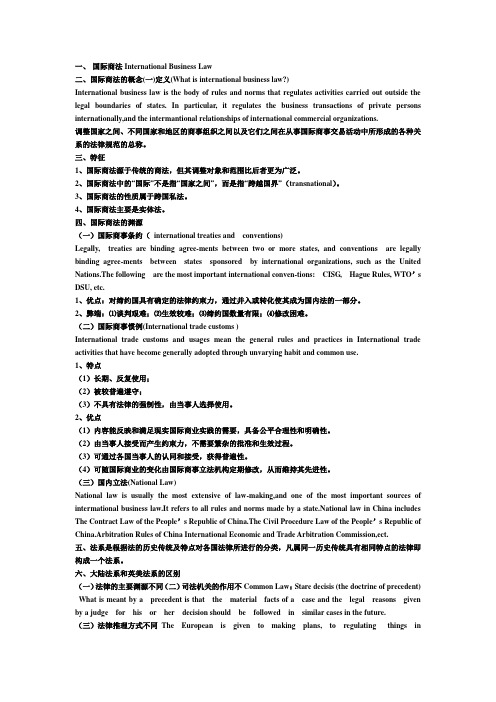
一、国际商法International Business Law二、国际商法的概念(一)定义(What is international business law?)International business law is the body of rules and norms that regulates activities carried out outside the legal boundaries of states. In particular, it regulates the business transactions of private persons internationally,and the intermantional relationships of international commercial organizations.调整国家之间、不同国家和地区的商事组织之间以及它们之间在从事国际商事交易活动中所形成的各种关系的法律规范的总称。
三、特征1、国际商法源于传统的商法,但其调整对象和范围比后者更为广泛。
2、国际商法中的“国际”不是指“国家之间”,而是指“跨越国界”(transnational)。
3、国际商法的性质属于跨国私法。
4、国际商法主要是实体法。
四、国际商法的渊源(一)国际商事条约(international treaties and conventions)Legally, treaties are binding agree-ments between two or more states, and conventions are legally binding agree-ments between states sponsored by international organizations, such as the United Nations.The following are the most important international conven-tions: CISG, Hague Rules, WTO’s DSU, etc.1、优点:对缔约国具有确定的法律约束力,通过并入或转化使其成为国内法的一部分。
- 1、下载文档前请自行甄别文档内容的完整性,平台不提供额外的编辑、内容补充、找答案等附加服务。
- 2、"仅部分预览"的文档,不可在线预览部分如存在完整性等问题,可反馈申请退款(可完整预览的文档不适用该条件!)。
- 3、如文档侵犯您的权益,请联系客服反馈,我们会尽快为您处理(人工客服工作时间:9:00-18:30)。
Introduction of Product Liability LawDefinitionHistory of Product Liability LawDefinitionA manufacturer‟s or seller‟s tort liability for damages or injuries suffered by a buyer, user, orbystander as a result of a defective product.产品责任是指生产者或销售者因其生产或销售的缺陷产品致使购买者,使用者以及旁观者遭受财产损害或人身伤害而需承担的侵权法律责任。
History of Product Liability LawOrigin: Precedents in the common law1842 Case of Winterbottom v. Wright by the Exchequer of Pleas1916 Doctrine of Negligence became the dominated principle in the product liability actions1965 Restatement (Second) of Torts published by the American Law Institute (ALI) established the doctrine of strict liability formally as the basis of product liability1985 European Economic Community (EEC) issued the Directive on Product LiabilityProduct Liability Law of the USATerms of Product LiabilityProducts 产品Defect 缺陷Persons Liable 责任主体Claimants 权力请求者Doctrines of Product LiabilityDoctrine of Negligence 疏忽责任理论Doctrine of Warranty 担保责任理论Doctrine of Strict Liability 严格责任理论Defenses 产品责任的抗辩Damage 损害赔偿ProductMUPLA:统一产品责任示范法Any object possessing intrinsic value, capable of delivery either as an assembled whole or as a component part or parts, and produced for introduction into trade or commerce. Human tissue and organs, including human blood and its components, are excluded from this term.The Third Restatement:侵权法重述(第三版)A product is tangible personal property distributed commercially for use or consumption.产品是经过商业性销售以供使用或消费的有形动产Services, even when provided commercially, are not products.服务,即使是商业性提供的,也不是产品Human blood and human tissue, even when provided commercially, are not subject to the rules of this Restatement.人体血液及人体组织器官,即使是商业性提供的,也不受本重述规则的约束ProductThe categories of products in product liability law also include:(1) natural products, such as primary agricultural products and animals天然产品,如原材料,原始农产品以及动物(2) intangible personal property, such as electricity (transmission of electricity) andinformation in media无形动产,如电和信息类产品(3) real property, e.g. a leased house不动产,如出售和出租的房屋DefectDefinition 定义Consumer Expectations Test 消费者期望标准Risk-utility Test 风险-效用比较标准Categories:Manufacturing Defect 产品的制造缺陷Design Defect 产品的设计缺陷Warning Defect 产品的警告缺陷DefinitionSecond Restatement uses “unreasonable danger” to define the defect.重述二把产品定义为“不合理的危险”In theory, every product contains danger, but only the product with unreasonable danger could be called as a defective product in the product liability law.How to Judge Whether the Danger Contained in the Product is Reasonable Consumer Expectations Test 消费者期望标准Beneficial to protect the consumer‟s interests and was helpful to enhance the safety level of the productsMight inflict heavy risk and liability upon the producers unreasonablyMight result in that the consumer‟s interests as a whole were damagedRisk-utility Test 风险-效用比较标准States that consumer expectation does not constitute an independent standard for judging the defectiveness of productIt is necessary to use the risk-utility balancing, “the emphasis is on creating incentives for manufacturers to achieve optimal levels of safety in designing and marketingproducts”“Society does not benefit from products that are excessively safe. Society benefits most when the right, or optimal, amount of product safety is achieved”Categories of DefectsManufacturing defect of productA physical departure from a product‟s intended design causing the product contains theunreasonable danger产品存在与该产品的设计意图相背离的物理状况,从而使该产品含有不合理的危险In such cases the injury was caused as a result of defect in the manufacturing of the product.These cases are the hardest to prove.产品的制造缺陷往往是生产者在产品的生产或管理过程中的疏忽所致Categories of DefectsDesign defect of productThe specific product unit conforms to the intended design but the intended design itself renders the product not reasonably safe产品虽然符合产品的设计意图,但该设计本身含有不合理的危险In these cases the injury was caused by a poor design despite the fact that there may be no defect in the individual product itself产品的设计缺陷不仅影响个别产品的安全性,而且会导致该设计下地整批产品存在缺陷Babcock v. General Motors CorporationThe [United States Court of Appeals] case arose from an accident on February 21, 1998, when a General Motors pickup truck driven by Paul A. Babcock, III, went off the road and struck a tree.The accident rendered Babcock a paraplegic. On June 15, 1999, Babcock died as a result of complications from his injuries.Plaintiff brought suit alleging negligence and strict liability against the defendant.Babcock v. General Motors CorporationThe jury returned a verdict finding GM liable on the negligence count and not liable on the strict liability count. It is undisputed that when Babcock was first seen after the accident his seat belt was not fastened around him.The complaint alleged that Babcock was wearing his seat belt prior to the accident, but that the belt unbuckled as soon as pressure was exerted on it and the buckle released due to a conditionknown as "false latching." The main focus of the trial was on this claim of false latching.Babcock v. General Motors CorporationThe original case was proven by the plaintiff and awarded unspecified amount. This case was won largely in part of expert testimony.The expert “determined crash speed by methodology generally accepted in accident reconstruction field and approved by National Highway Traffic Safety Administration (NHTSA) (Nordberg, 2003) .”His opinion was that the “seatbelt would have restrained passenger at that speed if nondefective and in use, and concluded from inspection of seatbelt that it had indeed been inuse just prior to impact (Nordberg, 2003) .”He also showed an alternative design from Volvo that helps prevent false latching.This case was affirmed and the court further awarded the plaintiff legal and court fees incurred during the appeals process.Categories of DefectsWarning defect of productThe product is lack of necessary and adequate instructions or warnings which would have reduced or eliminated the risk of products产品存在可以合理预见的危险,但产品的生产者或销售者没有提供必要和充分的产品使用说明或警告以降低或避免产品存在的危险These cases refer to injuries caused as a result of a product known to be potentially dangerous which was sold without warning labels or having inadequate labeling to properly warnthe consumer. Including inadequate or no instructions for proper setup, use ormaintenanceLaramendy v. MyersA theatrical smoke-producing device set fire to a child's dress."The written directions which were with the device when it was received, warned: to hold the device away from the face while filling the hole with powder; and to stand back without makingcontact (when the device is on the floor) so that 'puff' will not strike face."Notwithstanding these warnings the court found the warning was incomplete, affirmed a verdict for plaintiff, and held that the "defendants neglected to reasonably warn of the dangerouspropensities of the device. … There was no warning of danger from fire."Persons LiableMUPLAManufacturer: undertake the strict liabilityProduct seller other than manufacturer: undertake the fault-based liabilityThird Restatement:Manufacturing Seller: undertake the strict liability生产性销售商,主要是产品的生产者,承担严格责任Non-manufacturing seller: undertake the strict liability, because the seller as business entity is in a better position than is individual user and consumer to insure against the loss causedby the defective product非生产性销售商,主要是指从事产品销售或分销的销售者,包括产品的批发,分销和零售业者,此外还包括从事产品出租的经营者,在销售-服务混合经营中提供产品的经营者已经提供产品寄托的经营者In most instances, the seller will be able to pass liability costs up the chain of product distribution to the manufacturerClaimantsAny person or entity that suffers harm caused by the defective product, including the reasonably foreseeable bystanders.在产品责任法中,凡是其人身或财产因产品缺陷遭受损害的受害者都有权向产品的生产者或销售者提出产品责任的权利请求,无论前者与后者是否有合同关系,因此亦包可以合理预见的旁观者。
